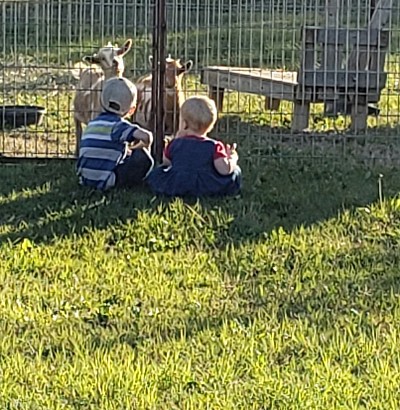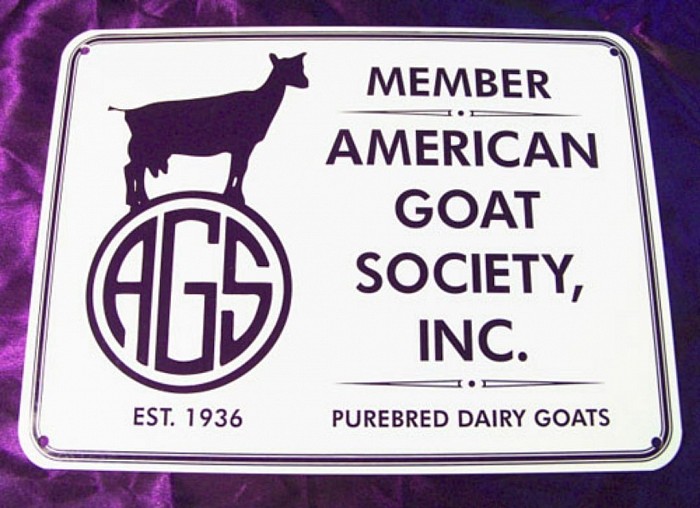Registered Nigerian Dwarf Goats
All About Our Little Farm/Busy Homestead
Saddlebag Farm is located in Seminole, TX. A small town in the panhandle of Texas, close to New Mexico. We keep a small herd of ADGA & AGS registered Nigerian Dwarf Dairy Goats on our little 2 acre homestead.
We've always had animals on our farm to raise our own meat and eggs. When we found out our daughter couldn't tolerate cow's milk very well, we decided to add goats.
In my research I found that Nigerian Dwarf goats were a great fit for us. They produce wonderful, sweet tasting milk with a high butterfat content. Aside from tasting good, the high butterfat also appealed to me because I wanted to make cheese and yogurt. Their small size, at 1/3 to 1/2 the size of standard goats, is the perfect size for me and the children to handle with confidence. They are a great choice for anyone wanting backyard milker as well as cute, fun loving pets. Now here comes the FUN part for me. I call it "The Challenge". 😁
The farmer we bought our first two Nigerians from convinced us to register them. He said they were easier to sell and cost the same to feed as unregistered goats. True. Well in registering them, I found out about ADGA's performance programs.🤩 I saw in them a challenge that got me hooked; and they will likely keep me from ever losing interest in goats.🐐🐐🐐🐐🐐🐐🐐🐐🐐
We started DHIR(Dairy Herd Improvement Registry) or milk test in 2020 and Linear Appraisal in 2021. As of 2023, we also DNA our breeding bucks to verify parentage. Someday I would like to test our goats for Casein, or the type of milk they produce.
Adding all these ADGA performance programs not only gives me a fun challenge, it also helps us to offer better goats to our fellow breeders and homesteaders. Goats with better milk production and conformation. Goats that can live healthier, longer lives because of it.
Our Style of Management
First and foremost, my husband's diagnosis of melanoma skin cancer in 2014 has forever changed our outlook on things. Although such things as organic and permaculture or all things natural had crossed my path before then, it was only a fleeting interest. Afterwards, it became a major focus and a way of life for our family. We figured out the things God made, i.e. plants or herbs, make very effective dewormers and are a great source of the minerals our goats need. We use herbal or natural supplements for as many goat ailments as we can. However, a good, small ruminate veterinarian is also essential for those times when we are at a loss. We use FAMACHA scoring, keep hooves trimmed regularly, and test our herd annually for CAE. We feed the best quality hay and Chaffhaye that we can get.
Our Style of Milking
We milk our goats once a day. We find this the best fit for us, right now, with 5 young children. This, however, hasn't stopped the ambitious side of me in breeding for better quality dairy goats. A lot of goats in the Nigerian Dwarf breed have milked over 1000# in one lactation, but how many have done that while milking Once A Day? Herd goals!😊 To achieve these goals, we need goats that can produce a good amount consistently for a long time.
Once again going back to the more natural way, we dam raise our kids. We love watching mamas with their kids and appreciate what they teach them. And hey, less work for us. The kids get a bottle on milk test days once a month, and they get separated from their dams at night starting at 2 weeks old. They're usually weamed between 8 and 12 weeks old. Mamas get milked starting at one or two days after kidding. Before the kids are weaned, we milk 2 times a day, on milk test days only, to reflect the true amount our does are producing. After the kids are weaned, it's just us, milking once a day, even on test days. Is it possible to get a 1000# lactation out of an ND at Once A Day milking? We are going to find out!
Our herd tested Negative for CAE as of August 2023.




